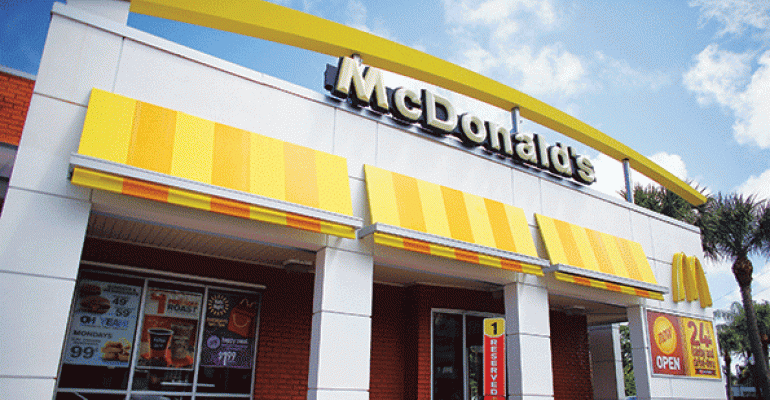McDonald’s Corp. same-store sales slowed in the second quarter, the company said Tuesday, amid a broader slowdown in the restaurant industry and mounting economic uncertainty.
The Oak Brook, Ill.-based burger giant said same-store sales rose 1.8 percent in the second quarter ended June 30 — well below Wall Street expectations. McDonald’s stock fell more than 4 percent through early Tuesday afternoon trading.
But company executives said during an earnings call Tuesday that they remain well ahead of the broader quick-service market. And they are focused on driving sales over the long-term through product improvement and customer service efforts.
“We plan to grow our business,” McDonald’s CEO Steve Easterbrook said during the call. “We’re not trying to do that on a quarter to quarter to quarter basis. We’re mindful of the short term, but have our eyes on the long term.”
Revenue in the quarter fell 4 percent, to $6.3 billion, from $6.5 billion the previous year, due largely to the impact of refranchising. Net income fell 9 percent, to $1.1 billion, or $1.25 per share, from $1.2 billion, or $1.26 per share the previous year. Profit fell largely due to one-time charges associated with strategic changes. Same-store sales worldwide rose 3.1 percent.
McDonald’s has unleashed a series of efforts over the past year and a half to recover from a three-year sales slide, and has seen some success as same-store sales increased in the U.S. in the fourth quarter last year and first quarter this year. The company’s all-day breakfast promotion and discounts helped generate those sales.
But the effectiveness of those efforts was reduced in the three spring months. Still, company executives said that the chain’s same-store sales outpaced the quick-service sandwich sector by 130 basis points. That suggests a broader, industry-wide slowdown.
Easterbrook said the pricing gap between restaurants and grocers is “a small part” of the slowdown. But he suggested broader concerns as a bigger issue.
“There’s generally a broader level of uncertainty in consumers’ mind at the moment, trying to gauge their financial security, with elections, global events,” he said. “They’re mindful of an unsettled world. When families are uncertain, caution prevails.”
McDonald’s is working on an expanded all-day breakfast menu to generate sales growth in the coming quarters as the chain runs against comparisons with strong growth that began late last year.
The chain will start serving biscuit, McMuffin and McGriddle sandwiches nationwide later this summer. McDonald’s will also work on improvements to its core menu, and is working on more sustainable sourcing initiatives around the world.
Executives also suggested more technology changes at its U.S. business to improve speed at the drive-thru, as well as the customer experience inside its domestic restaurants over the coming years.
Easterbrook said improved accuracy in the drive-thru, with the company’s “Ask, Ask, Tell” policy, has improved speed. He said online ordering could also improve speed in the future. And he suggested that voice recognition in the company’s drive-thru speaker could hasten speed.
The CEO also said that the company will continue to roll out its “Experience of the Future” in the U.S., much like it has done in places like France and Australia. That experience includes kiosks where customers can order customized burgers, as well as an app to reduce errors.
“It’s a fundamentally different experience,” Easterbrook said. “A lot of that does involve technology.”
Meanwhile, McDonald’s continues to refranchise its restaurants, although so far that has not involved the completion of expected large-scale deals in Asia.
Over the past year, for instance, the number of company-operated restaurants has declined by 519, from 6,656 units to 6,137, while the total number of global franchised locations has grown by 655, to 30,367 locations. Most of the refranchised restaurants have been sold to “conventional franchisees” while complex, large-scale deals “take time,” McDonald’s CFO Kevin Ozan said.
“We remain committed to moving toward a more heavy franchise system,” Ozan said during the conference call.
In the U.S., the total size of the brand keeps shrinking. McDonald’s has 14,186 restaurants, a decrease of 132 locations from a year ago.
Company-unit profit margins rose 30 basis points in the quarter, which executives considered a key win given that McDonald’s raised wages for workers last year. Lower commodity costs, expected to fall 3.5 percent to 4.5 percent this year, offset higher wages.
“Improvement in our second quarter margins is a noteworthy achievement,” Ozan said.
Executives on the call tampered expectations for some upcoming marketing initiatives: The Olympics and the mobile game Pokémon Go.
McDonald’s is sponsoring the Summer Olympics in Rio. Easterbrook said that the company is a “long-time sponsor” with the event, and will run some “fun engagement initiatives” in various markets. But, “I wouldn’t see it materially impacting the business,” he said.
As for Pokémon Go, of which McDonald’s is a sponsor in Japan, the relationship with the hugely popular game’s maker, Niantic, is “driven by our Japanese team” and “nothing else.”
“We’re certainly enjoying what it’s doing for our business in Japan,” Easterbrook said.
Contact Jonathan Maze at [email protected]
Follow him on Twitter: @jonathanmaze





